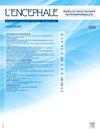法国生物精神病学和神经精神药理学学会(AFPBN)关于管理部分反应性抑郁症和耐药性抑郁症患者的指南:2024 年更新版。
IF 1.2
4区 医学
Q4 NEUROSCIENCES
Encephale-Revue De Psychiatrie Clinique Biologique et Therapeutique
Pub Date : 2025-02-01
DOI:10.1016/j.encep.2023.11.029
引用次数: 0
摘要
简介:本次更新的目的是增加新批准的重度抑郁障碍命名和治疗方法,以及尚未批准的治疗方法,从而扩大将抗药性因素纳入临床方法的讨论范围:与第一份基于兰德/加州大学洛杉矶分校适宜性方法的共识指南不同,法国生物精神病学和神经精神药理学协会(AFPBN)针对部分反应性抑郁症(PRD)和治疗抵抗性抑郁症(TRD)的管理制定了一份更新版指南。专家指南结合了科学证据和临床专家的意见,提出了针对部分反应性抑郁症(PRD)和难治性抑郁症(TRD)的建议:这些建议涉及三个领域,被认为是更新之前的2019年AFPBN TRD患者管理指南的关键:(1) TRD相关风险因素的识别;(2) PRD和TRD患者的治疗管理;(3) 近期谷氨酸受体调节剂(氯胺酮和氯胺酮)的适应症、使用方式和监测:这些以共识为基础的指南可以在现有的实证文献和临床实践之间架起桥梁,突出临床实践的 "真实世界",并以 TRD 专业处方者的经验为中心,辅以务实的方法。本文章由计算机程序翻译,如有差异,请以英文原文为准。
French Society for Biological Psychiatry and Neuropsychopharmacology (AFPBN) guidelines for the management of patients with partially responsive depression and treatment-resistant depression: Update 2024
Introduction
The purpose of this update is to add newly approved nomenclatures and treatments as well as treatments yet to be approved in major depressive disorder, thus expanding the discussions on the integration of resistance factors into the clinical approach.
Methods
Unlike the first consensus guidelines based on the RAND/UCLA Appropriateness Method, the French Association for Biological Psychiatry and Neuropsychopharmacology (AFPBN) developed an update of these guidelines for the management of partially responsive depression (PRD) and treatment-resistant depression (TRD). The expert guidelines combine scientific evidence and expert clinicians’ opinions to produce recommendations for PRD and TRD.
Results
The recommendations addressed three areas judged as essential for updating the previous 2019 AFPBN guidelines for the management of patients with TRD: (1) the identification of risk factors associated with TRD, (2) the therapeutic management of patients with PRD and TRD, and (3) the indications, the modalities of use and the monitoring of recent glutamate receptor modulating agents (esketamine and ketamine).
Conclusion
These consensus-based guidelines make it possible to build bridges between the available empirical literature and clinical practice, with a highlight on the ‘real world’ of the clinical practice, supported by a pragmatic approach centred on the experience of specialised prescribers in TRD.
求助全文
通过发布文献求助,成功后即可免费获取论文全文。
去求助
来源期刊
CiteScore
4.60
自引率
7.40%
发文量
162
审稿时长
6-12 weeks
期刊介绍:
Une revue française de renommée internationale.
- Un comite de rédaction représentant tous les aspects de la prise en charge psychiatrique du patient.
- Une sélection rigoureuse d''articles faisant l''objet de plusieurs expertises.
- Des travaux d''auteurs et de chercheurs de renommée internationale.
- Des indexations dans les grandes bases de données (Current Contents, Excerpta Medica, etc.).
- Un facteur d''impact qui témoigne de la grande notoriété de la revue.
La tribune des publications originales de haut niveau.
- Une très grande diversité des sujets traités, rigoureusement sélectionnés à travers des sommaires dynamiques :
- des éditoriaux de médecins référents,
- une revue de presse sur les actualités internationales,
- des articles originaux pour approfondir vos connaissances,
- des mises au point et des cas cliniques pour engager votre réflexion sur les indications et choix possibles au travers de mises en situation clinique,
- des dossiers thématiques pour faire le tour d''une question.
- L''actualité de l''AFPB : L''Encéphale publie régulièrement des comptes rendus de l''Association française de psychiatrie clinique.

 求助内容:
求助内容: 应助结果提醒方式:
应助结果提醒方式:


